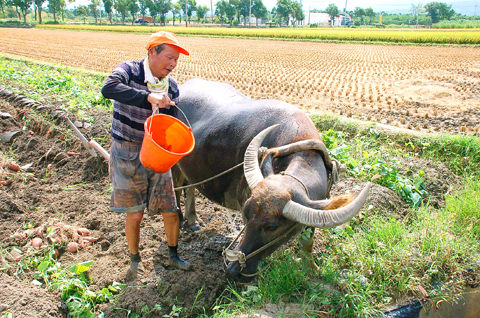The government said yesterday it would revert to using the floating fuel price mechanism on July 1, with the new price effective starting July 2.
Minister of Economic Affairs Yiin Chii-ming (尹啟銘) said that starting next month, the government would adjust oil prices on the first day of each month using its floating fuel price system.
Yiin made the remarks on the legislative floor yesterday in response to a question about the proposed electricity price rise from Democratic Progressive Party (DPP) Legislator Huang Wei-cher (黃偉哲).

PHOTO: HUANG SHU-LI, TAIPEI TIMES
Yiin said the ministry would announce the electricity price adjustment next week and that the new price would be effective starting on July 1.
The price of electricity would be increased when summer rates take effect from July to October and prices would be adjusted again in November, Yiin said, adding that the government had no immediate plans to adjust water prices.
Recent utility price increases have attracted complaints from the public. When the government announced it would raise fuel prices after taking office on May 20, it originally set the date for June 1, but a change of mind on May 27 brought the date forward to May 28, which led to long lines of scooters, cars and trucks at gas stations across the nation.
At the time, the government raised gasoline prices by NT$6.5 per liter and premium grade diesel by NT$7.2 per liter. The price adjustment next month will be the second adjustment to the gas price since the government assumed office.
Meanwhile, in other related news, DPP Legislator Pan Meng-an (潘孟安) condemned the government yesterday for favoring military veterans and their families by allowing Taiwan Power Co (Taipower, 台電) to provide them with electricity subsidies totaling NT$700 million (US$20 million) a year.
“Why should the public help pay the bills for those military veterans and their families? Why doesn’t Taipower give the subsidies to low-income families as well?” Pan said during a question-and-answer session at the legislature.
In response, Premier Liu Chao-shiuan (劉兆玄) promised to consider canceling the subsidies, while noting that the former DPP government had failed to cancel the subsidies for the past eight years.
Liu said the government also planned to provide subsidies to low-income families and also expressed his confidence that the government would be able to improve the economy.
Responding to DPP Legislator Hsueh Ling’s (薛凌) challenge over the stock market plunge since the new government assumed office, Liu said the government would be adopting more measures to improve the economy.
“There are many factors behind the stock market’s performance and some of them are not under the control of the government,” Liu said. “I believe that the overall economy will be much better by the end of the year when compared to other Asian countries.”

WAITING GAME: The US has so far only offered a ‘best rate tariff,’ which officials assume is about 15 percent, the same as Japan, a person familiar with the matter said Taiwan and the US have completed “technical consultations” regarding tariffs and a finalized rate is expected to be released soon, Executive Yuan spokeswoman Michelle Lee (李慧芝) told a news conference yesterday, as a 90-day pause on US President Donald Trump’s “reciprocal” tariffs is set to expire today. The two countries have reached a “certain degree of consensus” on issues such as tariffs, nontariff trade barriers, trade facilitation, supply chain resilience and economic security, Lee said. They also discussed opportunities for cooperation, investment and procurement, she said. A joint statement is still being negotiated and would be released once the US government has made

‘CRUDE’: The potential countermeasure is in response to South Africa renaming Taiwan’s representative offices and the insistence that it move out of Pretoria Taiwan is considering banning exports of semiconductors to South Africa after the latter unilaterally downgraded and changed the names of Taiwan’s two representative offices, the Ministry of Foreign Affairs (MOFA) said yesterday. On Monday last week, the South African Department of International Relations and Cooperation unilaterally released a statement saying that, as of April 1, the Taipei Liaison Offices in Pretoria and Cape Town had been renamed the “Taipei Commercial Office in Johannesburg” and the “Taipei Commercial Office in Cape Town.” Citing UN General Assembly Resolution 2758, it said that South Africa “recognizes the People’s Republic of China (PRC) as the sole

NEW GEAR: On top of the new Tien Kung IV air defense missiles, the military is expected to place orders for a new combat vehicle next year for delivery in 2028 Mass production of Tien Kung IV (Sky Bow IV) missiles is expected to start next year, with plans to order 122 pods, the Ministry of National Defense’s (MND) latest list of regulated military material showed. The document said that the armed forces would obtain 46 pods of the air defense missiles next year and 76 pods the year after that. The Tien Kung IV is designed to intercept cruise missiles and ballistic missiles to an altitude of 70km, compared with the 60km maximum altitude achieved by the Missile Segment Enhancement variant of PAC-3 systems. A defense source said yesterday that the number of

Taiwanese exports to the US are to be subject to a 20 percent tariff starting on Thursday next week, according to an executive order signed by US President Donald Trump yesterday. The 20 percent levy was the same as the tariffs imposed on Vietnam, Sri Lanka and Bangladesh by Trump. It was higher than the tariffs imposed on Japan, South Korea and the EU (15 percent), as well as those on the Philippines (19 percent). A Taiwan official with knowledge of the matter said it is a "phased" tariff rate, and negotiations would continue. "Once negotiations conclude, Taiwan will obtain a better